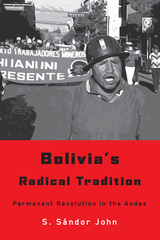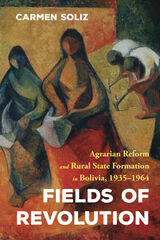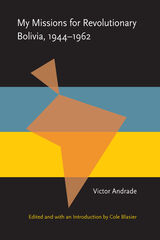Results by Title
3 books about Movimiento Nacionalista Revolucionario (Bolivia)
3 books about Movimiento Nacionalista Revolucionario (Bolivia)

Bolivia's Radical Tradition
Permanent Revolution in the Andes
S. Sándor John
University of Arizona Press, 2012
In December 2005, following a series of convulsive upheavals that saw the overthrow of two presidents in three years, Bolivian peasant leader Evo Morales became the first Indian president in South American history. Consequently, according to S. Sándor John, Bolivia symbolizes new shifts in Latin America, pushed by radical social movements of the poor, the dispossessed, and indigenous people once crossed off the maps of "official" history. But, as John explains, Bolivian radicalism has a distinctive genealogy that does not fit into ready-made patterns of the Latin American left.
According to its author, this book grew out of a desire to answer nagging questions about this unusual place. Why was Bolivia home to the most persistent and heroically combative labor movement in the Western Hemisphere? Why did this movement take root so deeply and so stubbornly? What does the distinctive radical tradition of Trotskyism in Bolivia tell us about the past fifty years there, and what about the explosive developments of more recent years? To answer these questions, John clearly and carefully pieces together a fragmented past to show a part of Latin American radical history that has been overlooked for far too long. Based on years of research in archives and extensive interviews with labor, peasant, and student activists—as well as Chaco War veterans and prominent political figures—the book brings together political, social, and cultural history, linking the origins of Bolivian radicalism to events unfolding today in the country that calls itself "the heart of South America."
[more]

Fields of Revolution
Agrarian Reform and Rural State Formation in Bolivia, 1935-1964
Carmen Soliz
University of Pittsburgh Press, 2021
Winner, 2023 Susan Socolow-Lyman Johnson Book Prize
Fields of Revolution examines the second largest case of peasant land redistribution in Latin America and agrarian reform—arguably the most important policy to arise out of Bolivia’s 1952 revolution. Competing understandings of agrarian reform shaped ideas of property, productivity, welfare, and justice. Peasants embraced the nationalist slogan of “land for those who work it” and rehabilitated national union structures. Indigenous communities proclaimed instead “land to its original owners” and sought to link the ruling party discourse on nationalism with their own long-standing demands for restitution. Landowners, for their part, embraced the principle of “land for those who improve it” to protect at least portions of their former properties from expropriation. Carmen Soliz combines analysis of governmental policies and national discourse with everyday local actors’ struggles and interactions with the state to draw out the deep connections between land and people as a material reality and as the object of political contention in the period surrounding the revolution.
Fields of Revolution examines the second largest case of peasant land redistribution in Latin America and agrarian reform—arguably the most important policy to arise out of Bolivia’s 1952 revolution. Competing understandings of agrarian reform shaped ideas of property, productivity, welfare, and justice. Peasants embraced the nationalist slogan of “land for those who work it” and rehabilitated national union structures. Indigenous communities proclaimed instead “land to its original owners” and sought to link the ruling party discourse on nationalism with their own long-standing demands for restitution. Landowners, for their part, embraced the principle of “land for those who improve it” to protect at least portions of their former properties from expropriation. Carmen Soliz combines analysis of governmental policies and national discourse with everyday local actors’ struggles and interactions with the state to draw out the deep connections between land and people as a material reality and as the object of political contention in the period surrounding the revolution.
[more]

My Missions for Revolutionary Bolivia, 1944-1962
Victor Andrade
University of Pittsburgh Press, 1976
Victor Andrade, Bolivian ambassador to the United States at various times between 1944 and 1962, recounts a unique Latin American perspective on U.S. politics and foreign policy. He describes meetings with Roosevelt, Truman, Eisenhower, and with the many journalists, cabinet members, senators, and House members who were part of his daily work in the world of Washington politics.
Andrade first came to Washington as ambassador in 1944, representing a young revolutionary government determined to check the power of the Bolivian tin barons who had dominated the country for decades. After his government was overthrown, he spent six years in exile, and returned to Washington when the Movimiento Nacionalista Revolucionario resumed power in 1952. His deep understanding of Washington's massive political and bureaucratic establishment, combined with his renowned charm, resourcefulness, and perseverance, gave him the ability to negotiate massive economic and military aid for the development of the country. It also allows him to present a candid, knowledgeable inside view of U.S.-Bolivian relations through these years which will at times make U.S. readers proud and at times ashamed.
Andrade first came to Washington as ambassador in 1944, representing a young revolutionary government determined to check the power of the Bolivian tin barons who had dominated the country for decades. After his government was overthrown, he spent six years in exile, and returned to Washington when the Movimiento Nacionalista Revolucionario resumed power in 1952. His deep understanding of Washington's massive political and bureaucratic establishment, combined with his renowned charm, resourcefulness, and perseverance, gave him the ability to negotiate massive economic and military aid for the development of the country. It also allows him to present a candid, knowledgeable inside view of U.S.-Bolivian relations through these years which will at times make U.S. readers proud and at times ashamed.
[more]
READERS
Browse our collection.
PUBLISHERS
See BiblioVault's publisher services.
STUDENT SERVICES
Files for college accessibility offices.
UChicago Accessibility Resources
home | accessibility | search | about | contact us
BiblioVault ® 2001 - 2024
The University of Chicago Press









